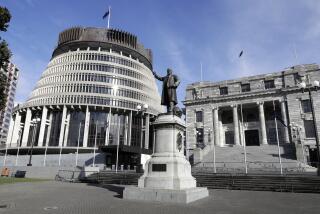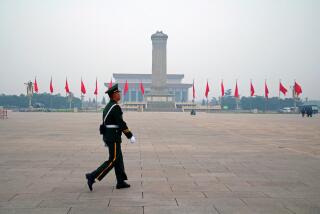Snowden says U.S. and Britain spy on friends as well as foes
In the middle of the G-8 summit in Northern Ireland early this week, the host, British Prime Minister David Cameron, and his closest international partner, President Obama, were embarrassed by the latest revelations of secret spying sprung on them by elusive whistle-blower Edward Snowden.
Reported in Britain’s Guardian newspaper, Snowden provided information about British and U.S. spying operations during past Group of 8 summits and the G-20 economic gathering in London in 2009. Turkey, South Africa and Russia were apparently targets of the snooping.
The news put another layer of ice on the already chilled relations between the U.S. and Russia. In a Reuters photograph taken Monday at a joint appearance by Obama and Russia’s Vladimir Putin, the two presidents displayed all the discomfort of two parties in a bitter divorce forced to sit beside each other at their son’s wedding.
Back in the Kremlin, Russian politicians were lining up to take shots at the U.S. One of them, the vociferously anti-American Alexey Pushkov, head of the Duma’s international affairs committee, tweeted: “Scandal! In 2009 at the G20, US and UK special services listened to [then-Russian President Dmitry] Medvedev’s telephone calls. The US denies it, but we can’t believe that. That’s complete fraud.”
The South Africans and the Turks, as allies of the Brits, were quite miffed as well. Participants in this week’s meeting must have all wondered if their communications were being monitored. If it happened before, why should this time be different?
There are a number of reasons the U.S. and the U.K. might want to take the risk of spying on friends, as well as adversaries -- spying, after all, is something governments of all kinds have found useful for centuries -- but a new element in the equation may be simply that it has become so enticingly easy, thanks to advances in technology. One story in the Guardian addressed this:
“Leaks of documents suggest it is impossible to quench the appetite of the intelligence agencies and their clients, notably the ministers to whom they are responsible. Britain’s spies say they are ultimately accountable to ministers, the people who are urging the spies on.”
In other words, a spy’s whole purpose in life is to gather information, and government officials know information is power. It’s a symbiotic relationship, and even the occasional embarrassing exposure is unlikely to quell the compulsion to use the new technological tools to find out more and more and more.
More to Read
A cure for the common opinion
Get thought-provoking perspectives with our weekly newsletter.
You may occasionally receive promotional content from the Los Angeles Times.







